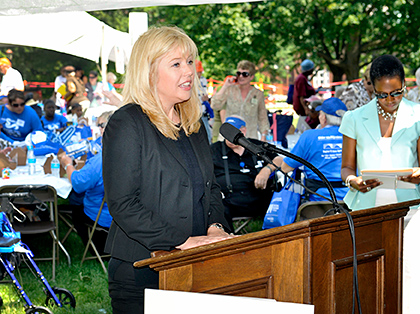AARP Hearing Center

By Melissa Preddy
Many Michigan residents enjoy the benefits of a mobile society, from winters in Arizona to corporate assignments around the country.
But some have discovered the downside of that freedom to roam: Each state has its own probate, estate and guardianship laws, which don’t always mesh. Those differences can cause problems for people caring for an older loved one.
Two bills sponsored by state Sen. Tonya Schuitmaker (R-Lawton) aim to streamline the process for families whose caregiving roles cross state lines by syncing Michigan law with standards adopted by other states.
The proposals are based on model legislation known as the Uniform Adult Guardianship and Protective Proceedings Jurisdiction Act, which was developed by a national commission to help ensure that court-ordered legal guardianships are portable from state to state. The rules also clarify jurisdiction, when there is a conflict, by helping states agree upon the definition of a person’s “home state.”
Adopted by 37 states
“This law provides for reciprocity among the states,” said Lisa Dedden Cooper, manager of advocacy for AARP Michigan, which is urging passage of the bills. She noted that 37 states have adopted the standards as law.
“It isn’t something that affects a whole lot of people, but when it does, it is very costly and complicated,” she said. “Plus, we have more people moving out of state and away from elderly parents to take jobs, and an increasing incidence of dementia.”
The Michigan Dementia Coalition estimates 240,000 state residents suffer from some form of dementia. That prevalence is expected to increase as the population ages. About 1.5 million adults nationwide are cared for by a guardian, according to a recent AARP Public Policy Institute report.
Cooper offered the hypothetical case of a woman who divides her year between homes in Florida and Michigan, while an adult son lives in a third state. Without the uniform standards, state courts—as well as hospitals, nursing homes and other entities with an interest in a patient’s well-being—could be confused about where jurisdiction lies when considering guardianship.
In addition to defining what constitutes a person’s home state when he or she spends part of the year in a different state, the standards make it easier for family members to register guardianship with all the states in which the person being cared for resides.
The home state language—which gives preference to courts in the place of primary residence—also discourages “granny snatching,” the practice of taking a vulnerable adult from a caregiver and across state lines to establish a quickie guardianship, often for control of money or other assets. While such cases are rare, they are of concern, said Keith Morris, president and CEO of Elder Law of Michigan, a nonprofit advocacy group.
Taken across state lines
“Because Michigan hasn’t adopted [the standards], guardians ... have no legal authority in the other state,” Morris said.
He received an inquiry on behalf of a man whose disabled wife was taken out of state by her children, one of whom was appointed guardian by the other state and filed for divorce on behalf of the wife, who has Alzheimer’s disease.
“The [uniform standards] could have given Michigan courts the ability to issue an order for her return,” Morris said.
Families often can avert conflicts over guardianship by designating caregivers in advance of need, said Brad Vauter, a Lansing attorney who specializes in elder law issues. Spouses are not automatically each other’s guardian, he said, although in the absence of family strife, health care institutions and courts generally give preference to next of kin.
Melissa Preddy is a writer living in Plymouth, Mich.































































